|
Page < 1 2 3 4 5 6 7 8 9 10 11 12 13 14 15 16 17 18 19 20 21 22 23 24 >
Famines
in British India: An enduring
disaster of the Raj
In 1901, shortly before the death of
Queen Victoria, the radical writer William Digby
looked back to the 1876 Madras famine and confidently asserted: "When the
part played by the British Empire in the 19th century is regarded by the
historian 50 years hence, the unnecessary deaths of millions of Indians would be
its principal and most notorious monument." Who now remembers the Madrasis?
In
the 19th century, however, drought was treated, particularly by the English in
India, as an opportunity for reasserting sovereignty.
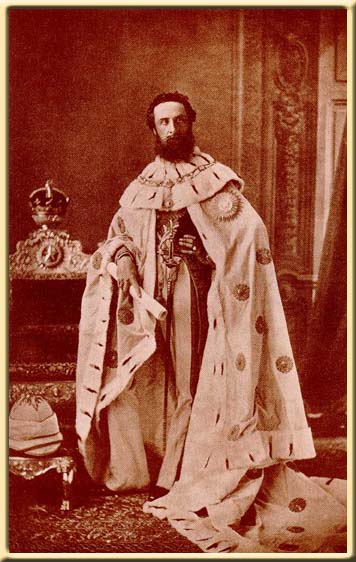 During
1876 Lord Lytton, widely suspected to be
insane, ignored all efforts to alleviate the suffering of millions of peasants
in the Madras region and concentrated on preparing for Queen
Victoria's investiture as Empress of India. The highlight of the
celebrations was a week-long feast of lucullan excess at which 68,000
dignitaries heard her promise the nation "happiness, prosperity and
welfare". During
1876 Lord Lytton, widely suspected to be
insane, ignored all efforts to alleviate the suffering of millions of peasants
in the Madras region and concentrated on preparing for Queen
Victoria's investiture as Empress of India. The highlight of the
celebrations was a week-long feast of lucullan excess at which 68,000
dignitaries heard her promise the nation "happiness, prosperity and
welfare".
(For more on Lord Lytton:
India's Nero - Please refer to
chapter on Glimpses).
Traditional Indian polities like the Moguls and
the Marathas had
zealously policed the grain trade in the public interest, distributing free
food, fixing prices and embargoing exports. As one horrified British
writer discovered, these 'oriental despots' sometimes
punished traders who short-changed peasants during famines by amputating
equivalent weights of merchant flesh.
The British worshipped a savage god known as the
'Invisible Hand' that forbade state interference in the grain trade. Like
previous viceroys (Lytton in 1877 and Elgin in 1897), Lord
Curzon allowed food surpluses to be exported to England or hoarded by
speculators in heavily guarded depots. Curzon, whose appetite for viceregal pomp
and circumstance was legendary, lectured starving villagers that 'any government
which imperiled the financial position of India in the interests of prodigal
philanthropy would be open to serious criticism; but any government which by
indiscriminate alms-giving weakened the fibre and demoralised the self-reliance
of the population, would be guilty of a public crime'.
Lord Curzon as a celebration of imperialist
ideals, even forbade the singing of a particular hymn because it contained an
inappropriate reminder of that kingdoms "may rise and wane."
(source: Colonial
Overlords: Time Frame Ad 1850-1900 -
Time-Life Books. The Scramble for Africa p. 33).
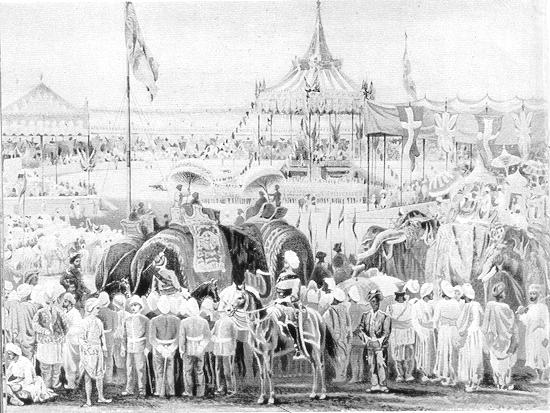
The empire had its circumstance
to impress the native princes and people. At Delhi in 1877, a great display was
made to announce the queen's assumption of the title of Empress of India.
(image source: Bound to Exile - By Michael Edwardes).
***
Vaughan Nash of the Manchester Guardian and Louis
Klopsch of the New York Christian Herald were appalled by Curzon's 'penal
minimum' ration (15 ounces of rice for a day's hard labour) as well as the
shocking conditions tolerated in the squalid relief camps, where tens of
thousands perished from cholera.
'Millions of flies,'
wrote Klopsch, 'were permitted undisturbed to pester the unhappy victims. One
young woman who had lost every one dear to her, and had turned stark mad, sat at
the door vacantly staring at the awful scenes around her.'
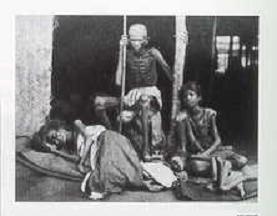
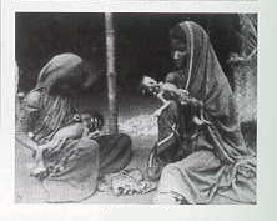
Famine: Victims of the 1876-77. Famine awaits death.
(image source: Raj: the Making and Unmaking of British India - by Lawrence
James).
***
Despite
Kiplingesque myths of heroic benevolence, official attitudes were nonchalant.
British officials rated Indian ethnicities like cattle, and vented contempt
against them even when they were dying in their multitudes.
Asked to
explain why mortality in Gujarat was so high, a district officer told the famine
commission: 'The Gujarati is a soft man... accustomed to earn his good food
easily. In the hot weather, he seldom worked at all and at no time did he form
the habit of continuous labour. Very many even among the poorest had never taken
a tool in hand in their lives. They lived by watching cattle and crops, by
sitting in the fields to weed, by picking cotton, grain and fruit, and by...
pilfering.'
Lytton believed in free trade. He did nothing to
check the huge hikes in grain prices, Economic "modernization" led
household and village reserves to be transferred to central depots using
recently built railroads. Much was exported to England, where there had been
poor harvests. Telegraph technology allowed prices to be centrally co-ordinated
and, inevitably, raised in thousands of small towns. Relief funds were scanty
because Lytton was eager to finance military campaigns in Afghanistan.
Conditions in emergency camps were so terrible that some peasants preferred to
go to jail. A few, starved and senseless, resorted to cannibalism. This was all
of little consequence to many English administrators who, as believers in
Malthusianism, thought that famine was nature's response to Indian
over-breeding.
 It
used to be that the late 19th century was celebrated in every school as the
golden period of imperialism. While few of us today would defend empire in moral
terms, we've long been encouraged to acknowledge its economic benefits. Yet, as
Davis points out, "there was no increase in India's per capita income from
1757 to 1947". It
used to be that the late 19th century was celebrated in every school as the
golden period of imperialism. While few of us today would defend empire in moral
terms, we've long been encouraged to acknowledge its economic benefits. Yet, as
Davis points out, "there was no increase in India's per capita income from
1757 to 1947".
As the great Indian political economist Romesh
Chunder Dutt pointed out in one of his Open Letters to Lord Curzon British
Progress was India's Ruin. The railroads, ports and canals
which enthused Karl Marx in the 1850s were for resource extraction, not
indigenous development. The taxes that financed the railroads and the
Indian army pauperised the peasantry. Not surprisingly, there was no increase in
India's per capita income during the whole period of British overlordship from
1757 to 1947. Celebrated cash-crop booms went hand in hand with declining
agrarian productivity and food security. Moreover, two decades of demographic
growth (in the 1870s and 1890s) were entirely wiped out in avoidable famines,
while throughout that 'glorious imperial half century' from 1871 to 1921
immortalised by Kipling, the life expectancy of ordinary Indians fell by a
staggering 20 per cent.
Author and political activist Mike Davis poses the question in
his book, Late Victorian Holocausts:
“How do we weigh
smug claims about the life-saving benefits of steam transportation and modern
grain markets when so many millions, especially in British India, died along
railroad tracks or on the steps of grain depots?”
(source: The
Observer - 'Late
Victorian Holocausts' By
Mike Davis
http://www.observer.co.uk/comment/story/0,6903,436495,00.html
http://books.guardian.co.uk/reviews/history/0,6121,424896,00.html).
A
Glowing account: How
an American Christian Missionary wrote about
British India
What has
England
done for
India
?
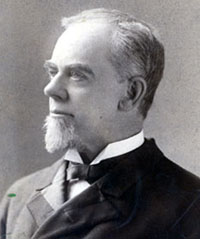 India
is no longer the prey of
Western ambitious powers. It is a solid part of the British possessions. It
knows, because it is a solid part of the British possession. It knows, because
it sends its troops that
England
cannot fight in a battle in
Europe
without its help. The expansion of education among all classes of people, the
physical care of the helpless classes, the subtle bond of the English language,
the development of the soil, the utilizing of the mineral wealth, the opening
of the country for the incoming of Western ideas, and greater than all
combined, the breaking down of all doors for the free spread of the Gospel.
England
has never achieved grander victories over
Waterloo
or
Quebec
than those which belong to her quiet and peaceful administration of
India
. The day has not yet dawned when it is possible to measure the whole magnitude
of
England
’s service to the millions of
India
. Generations must elapse before this can be done. When the hour does come, it
will be seen that the Englishman has never been wiser or more humane on the
Thames or that St. Lawrence than on the Ganges, the Indus, and the
Godavari
. The real fact is, not that he has conquered the country, but that he has
discovered it, and now governs it by as generous laws, and as even justice as
he rules over the millions within sight of his parliament at Westminster.
India
is no longer the prey of
Western ambitious powers. It is a solid part of the British possessions. It
knows, because it is a solid part of the British possession. It knows, because
it sends its troops that
England
cannot fight in a battle in
Europe
without its help. The expansion of education among all classes of people, the
physical care of the helpless classes, the subtle bond of the English language,
the development of the soil, the utilizing of the mineral wealth, the opening
of the country for the incoming of Western ideas, and greater than all
combined, the breaking down of all doors for the free spread of the Gospel.
England
has never achieved grander victories over
Waterloo
or
Quebec
than those which belong to her quiet and peaceful administration of
India
. The day has not yet dawned when it is possible to measure the whole magnitude
of
England
’s service to the millions of
India
. Generations must elapse before this can be done. When the hour does come, it
will be seen that the Englishman has never been wiser or more humane on the
Thames or that St. Lawrence than on the Ganges, the Indus, and the
Godavari
. The real fact is, not that he has conquered the country, but that he has
discovered it, and now governs it by as generous laws, and as even justice as
he rules over the millions within sight of his parliament at Westminster.
A
French scholar Barthelemy St. Hilaire, (1805
- 1895) in his book, “L’Inde Anglaise; son Etat Actuel son Avenir, has
written:
“Neither
in the Vedic times, nor under the great Ashoka, nor under the Mohammedan
conquest, nor under the Moguls, all powerful as they were for a while, has
India
ever obeyed an authority so sweet, so intelligent
and so liberal.”
England
has been a blessing to the
helpless continent.
England
has conquered
India
. But it has been less a conquest by steel and gunpowder than by all the great
forces which constitutes a Christian civilization.
(source:
Indika:
The Country and the people of India and Ceylon - By
Rev. John F Hurst p.
755 - 766).
***
In
Bombay, in famine camps, Sir A. P. Macdonnell,
President of the Famine Commission, reported, the people "died like
flies."
(source:
India
And Her People - By Swami Abhedananda
p.144).
Amitav
Ghosh author
of several books, The Circle of Reason (1986), won France's top literary award,
Prix Medici Estranger, and The
Glass Palace also
makes fun of the claim that the British gave India the railways.
"Thailand has
railways and the British never colonized the country," he says.
"In 1885, when the British invaded Burma, the Burmese king was already
building railways and telegraphs. These are things Indians could have done
themselves."
(source: Travelling
through time - interview with Amitav Ghosh).
Nick
Robins in his article titled "Loot" has said: "The
East India Company found India rich and left it poor."
And
for many Indians, it was the Company's plunder that first de-industrialized that
country and then provided the finance that fuelled Britain's own industrial
revolution." There was no increase in India per capita income between 1757
and 1947" In the beginning, Britain was buying cloth
made in India. In the end, India was buying cloth made in Britain, paying for it
not only with money but with the blood of its people. History teaches us that
history must never be forgotten.
(source: East
India Company - By Omar Kureishi )
According to Francois
Gautier: " The British did
impoverish India: according to British records, one million Indians died of
famine between 1800 and 1825, 4 million between 1825 and 1850, 5 million between
1850 and 1875 and 15 million between 1875 and 1900. Thus 25 million Indians died
in 100 years! (Since Independence, there has been no such famines, a record of
which India should be proud.)" (source: rediff.com).
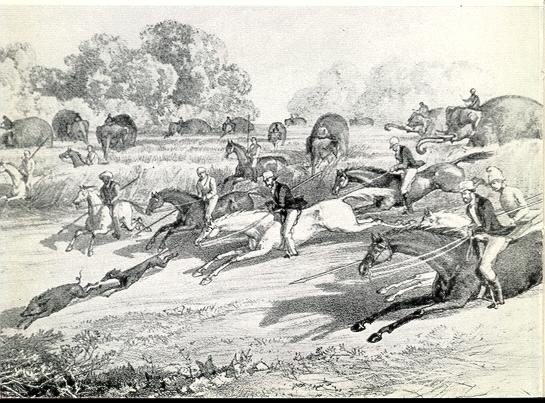
The
British hunting in India
***
Mrs Aruna Asaf Ali "
How can a civilized and enlightened people like the British have kept us so
backward and divided? They tried to educate a certain middle-class and allowed
it all the facilities; but the basic reforms they did not carry out. Our
literacy rates were so poor, and our technology has taken years to catch up with
modern developments."
(source:
Indian
Tales of the Raj - By Zareer Masani p. 130).
An English friend of India said,
"England, through her missionaries, offered the people of India thrones of
gold in another world, but refused them a simple chair in this world."
(source:
India
And Her People - By Swami Abhedananda
p.169).
William Samuel Lilly, in
his India
and Its Problems writes as follows:
"During the first eighty years of the nineteenth century, 18,000,000 of
people perished of famine. In one year alone -- the year when her late
Majesty assumed the title of Empress -- 5,000,000 of the people in Southern
India were starved to death. In the District of Bellary, with which I am
personally acquainted, -- a region twice the size of Wales, --
one-fourth of the population perished in the famine of 1816-77. I shall never
forget my own famine experiences: how, as I rode out on horseback, morning after
morning, I passed crowds of wandering skeletons, and saw human corpses by the
roadside, unburied, uncared for, and half devoured by dogs and vultures; how,
sadder sight still, children, 'the joy of the world,' as the old Greeks deemed,
had become its ineffable sorrow, and were forsaken by the very women who had
borne them, wolfish hunger killing even the maternal instinct. Those children,
their bright eyes shining from hollow sockets, their nesh utterly wasted away,
and only gristle and sinew and cold shivering skin remaining, their heads mere
skulls, their puny frames full of loathsome diseases, engendered by the
starvation in which they had been conceived and born and nurtured -- they
haunt me still." Every one who has gone much about India in famine times
knows how true to life is this picture.
Says Sir Charles Elliott
long the Chief Commissioner of Assam, "Half the agricultural population do
not know from one half year's end to another what it is to have a full
meal." Says the Honorable G. K. Gokhale,
of the Viceroy's Council, "From 60,000,000 to 70,000,000 of the people of
India do not know what it is to have their hunger satisfied even once in a
year."
(source:
India
in Bondage: Her Right to Freedom - By Jabez T. Sunderland p.
11-12).
Suhash
Chakravarty has brilliantly observed in his book, The Raj
Syndrome: "The vision of the Roman Empire did not merely inspire the
Raj. It was universally claimed that the Raj was the inheritor of the political
and cultural legacy of Rome. This was characterized by
snobbery, ruthlessness, and intolerance which were given the nomenclature of
patriotism, loyalty and fortitude. Economic benefits were dressed in idealist
garb, mercenary motives in a moral crusade and romance and adventure camouflaged
political and military aggression.
As a substitute to Greek and
Roman theatre, the American films arrived – early Christian films complete
with gladiators and lions, those of Tarzan and the Apes, the ‘westerns’ with
trigger-happy cowboys chasing the feathered Indian, followed by the urbanized
‘westerns’ where cars replaced horses and ‘cops’ replaced cowboys. The
impact was remarkable because the attempt had been to reduce the quantum of
wisdom and wit to the minimum. Superimposed on this was
the idea of the ‘chosen people’ operating on the doctrine of Christianity.
God was supposed to back only the Christians. Christianity was offered as
synonymous with science which was called service and service was the other name
for sharp shooting guns."
(source: The
Raj Syndrome: A Study in Imperial Perceptions - By Suhash Chakravarty.
Penguin Books. 1991 193).
  
Page < 1 2 3 4 5 6 7 8 9 10 11 12 13 14 15 16 17 18 19 20 21 22 23 24 >
|